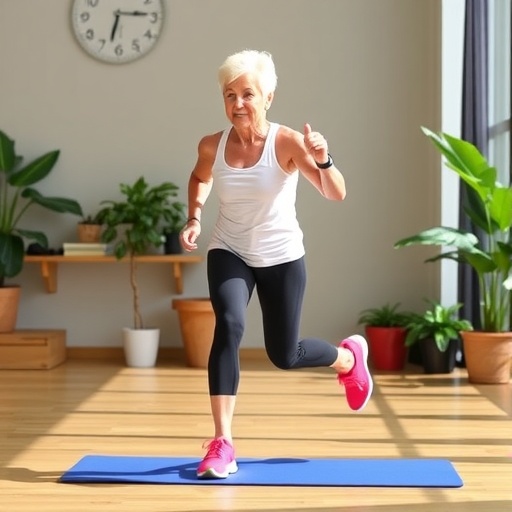In a groundbreaking study poised to reshape rehabilitation strategies for individuals grappling with diabetic peripheral neuropathy (DPN), researchers have unveiled compelling insights into the benefits of multisystem exercises. This innovative approach aims to address a host of mobility-related challenges that often accompany DPN, a frequent consequence of diabetes that leads to significant balance and postural stability issues. The randomized controlled trial, primarily conducted by Khurshid and colleagues, sheds light on how engaging in structured physical activity can enhance the quality of life for patients suffering from this condition.
Diabetic peripheral neuropathy can be a debilitating ailment, leading to substantial pain and reduced mobility among patients. While traditional treatment options exist, there has been a growing interest in non-pharmacological interventions that can complement medical approaches. The present study offers critical evidence in favor of multisystem exercises as a viable option for improving various physical domains important for daily functioning.
The trial involved a carefully selected group of participants diagnosed with DPN, ensuring that findings would be relevant and applicable to a broad population experiencing similar challenges. Participants were divided into experimental and control groups, with the former engaging in a series of multisystem exercises designed to improve not only balance but also mobility and walking speed. Control group members received standard care, which provided a clear benchmark against which to measure the effects of the intervention.
The exercises included in the study were meticulously designed to target multiple physiological systems, thereby fostering improvements across different physically meaningful metrics. By integrating strength training, balance work, and flexibility protocols, the researchers constructed a comprehensive rehabilitation regimen that aimed to stimulate both the neuromuscular system and improve cardiovascular health, essential in managing diabetes.
Results indicate that individuals who participated in the multisystem exercise program displayed significant enhancements in both balance and postural stability when compared to their control group counterparts. This observable improvement is critical, as maintaining stability is essential in reducing the risk of falls, a common threat for individuals with neuropathy-related balance impairments. Patients reported feeling more secure on their feet, a psychological improvement that often accompanies higher physical stability.
Moreover, aside from physical improvements, participants in the experimental group also noted a decrease in pain levels—a crucial outcome given the prevalent chronic pain associated with DPN. Pain reduction not only enhances the quality of life but also motivates individuals to engage more actively in physical activities, thus creating a positive feedback loop that encourages ongoing participation in exercise programs.
Walking speed, often a sensitive indicator of mobility and functional independence, showed marked improvement among those engaged in the exercise program. Faster walking speeds can significantly affect one’s ability to conduct daily activities and contribute to a sense of autonomy. The trial demonstrated the potential for multisystem exercises to yield meaningful changes in the walking dynamics of patients with DPN, ultimately promoting greater independence.
The study also emphasized the importance of adherence to the intervention. Participants who actively engaged in the exercise regimen reported increased motivation, primarily due to the social interaction involved in group sessions. The team-oriented nature of the exercises not only facilitated improvement in individual performance metrics but also fostered a sense of community and support that proved beneficial in motivating sustained participation.
Following the completion of the trial, the findings were peer-reviewed and published in BMC Neuroscience, a respected journal in the field, ensuring that the results would reach other researchers and practitioners dedicated to improving outcomes for patients with DPN. The publication is expected to influence clinical practices and rehabilitation strategies, urging healthcare professionals to incorporate multisystem exercises into standard care protocols for diabetic patients.
In conclusion, this research represents a pivotal step forward in the management of diabetic peripheral neuropathy. The integration of multisystem exercises into treatment plans offers an innovative, evidence-based avenue for patients struggling with the multifaceted challenges posed by DPN. As further studies unfold, practitioners may find themselves equipped with a powerful tool, enabling them to assist patients in reclaiming their mobility and enhancing overall life satisfaction.
As the medical community continues to explore and validate similar exercise interventions, this study serves as a beacon of hope for those affected by diabetes and its complications. The potential for lifestyle changes to yield tangible health benefits is vast, paving the way for better self-management strategies in an era where chronic conditions increasingly challenge healthcare systems worldwide. The findings underscore the critical need for a holistic approach to treating the effects of diabetes, reinforcing that everyone deserves access to interventions designed to improve their quality of life.
Given the positive implications of the study’s findings, ongoing research will be essential. Future inquiries may delve deeper into the specific types of exercises that yield the highest benefits or explore variations in programs tailored to individuals with differing levels of neuropathy severity. The ultimate goal, however, remains clear: to enhance the lives of those afflicted with diabetic peripheral neuropathy and empower them through improved physical and mental health.
Subject of Research: Effects of multisystem exercises on balance, postural stability, mobility, walking speed, and pain in patients with diabetic peripheral neuropathy.
Article Title: Effects of multisystem exercises on balance, postural stability, mobility, walking speed, and pain in patients with diabetic peripheral neuropathy: a randomized controlled trial.
Article References:
Khurshid, S., Saeed, A., Kashif, M. et al. Effects of multisystem exercises on balance, postural stability, mobility, walking speed, and pain in patients with diabetic peripheral neuropathy: a randomized controlled trial.
BMC Neurosci 26, 16 (2025). https://doi.org/10.1186/s12868-024-00924-6
Image Credits: AI Generated
DOI: 10.1186/s12868-024-00924-6
Keywords: diabetic peripheral neuropathy, multisystem exercises, balance, mobility, walking speed, pain




